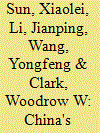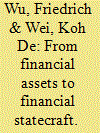|
|
|
Sort Order |
|
|
|
Items / Page
|
|
|
|
|
|
|
| Srl | Item |
| 1 |
ID:
127295


|
|
|
|
|
| Publication |
2014.
|
| Summary/Abstract |
Sovereign Wealth Funds (SWFs) are state-owned investment funds that invest in real and financial assets. Since the global financial crisis in 2008, SWFs' investments have resulted in national security concerns of host countries because SWFs continue to expand rapidly and have become increasingly active in real-time strategic transactions. Given this background, China, which has the biggest SWF in the world, is facing severe challenges of energy resources shortages while its plan is to accomplish social and economic development goals. Energy security is a key driving force of the energy investment policy of China's SWFs. This makes the SWF investments more complicated and more politically sensitive. The combination of sovereign rights and the strategic importance of energy also makes geopolitics more complicated and brings more uncertainty to SWF investments. This article explores the relationship between energy security and energy investments of China's SWFs. It is recognised that the energy investment of SWFs must follow a sustainable path to coordinate energy security, economic growth, return on investment and national security concerns. Government policymakers are urged to balance the financial and political returns on SWFs against potential negative effects. The conclusion presents insights for policymakers, energy scholars and SWF researchers.
|
|
|
|
|
|
|
|
|
|
|
|
|
|
|
|
| 2 |
ID:
133809


|
|
|
|
|
| Publication |
2014.
|
| Summary/Abstract |
Over the past few decades, China has accumulated over US$3.4 trillion of official foreign exchange reserves as it rises to become a global power. Do China's financial assets increase its ability to pursue its national interests internationally? With the globalisation and rising influence of Chinese state-owned enterprises, state-owned banks and sovereign wealth fund, as well as China's growing clout in several regional groupings, it is clear that China does possess the necessary mechanisms to assert its financial power. This article examines the efficacy and limitations of these mechanisms in Africa and Latin America, in the economic and political domains. In the economic domain, China has consistently used foreign oil contracts and acquisitions to secure direct oil flow from developing nations. An analysis of recent cases shows that while China is able to successfully harness its financial power in its pursuit of oil, it needs to fulfil its promises to the satisfaction of the recipient countries in order to maintain the value of its offers. In the political domain, China has used its financial assets to purchase diplomatic allegiance from various African and Latin American countries in support of its One-China policy. Studying both successful and unsuccessful cases reveals that while China is generally able to use its financial power in third-world countries against Taiwan successfully, its national goals have, in recent years, shifted to the economic realm, even with countries that still recognise the Taipei government.
|
|
|
|
|
|
|
|
|
|
|
|
|
|
|
|
|
|
|
|
|